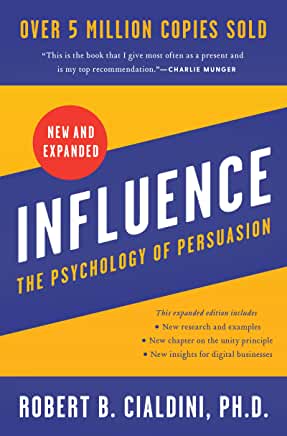If there were one book I would advise any lobbyist to read to improve their craft, it is Robert B.Cialdini’s ‘Influence: The Psychology of Persuasion.’

I spent my summer vacation reading the new and expanded classic. Every time I read it, some new nugget of practical advice jumps off the page.
7 Principles to Follow
If you want to know if you have influence, there are seven principles you need to follow.
If you follow them, it is likely your influence will grow.
- Reciprocation: The old give and take
- Liking: People prefer similarities
- Social Proof: People do what they observe others doing
- Authority: Directed deference
- Scarcity: Less quantity equals more demand
- Unity: The “We” is the Shared We
- Commitment and Consistency
The Upsides of following the 7 Levers of Influence
There are some big upsides to being known for the qualities that these principles reflect. In any regulated sector, you’ll benefit from the doubt, be brought to the table before others, and have your views genuinely listened to. Some organisations may even get a seat at the drafting table.
Over 20 plus years, I’ve had the pleasure to work with some organisations that have had that influence. When speaking to people who brought about the state, it is clear they used many, if not all, of Caldini’s seven levers of influence.
How to Use Them
I use them in two ways.
1. A Questionaire.
I’ve paraphrased Caldini’s principles to a simple set of questions to ask key decision makers and influencers about potential/ new clients.
The answers to the questions help show how trusted a client is seen by key decision makers and influencers. I’ve found the off-the-record conversations are unnervingly accurate.
You will often need to ensure that these points are strong or become strong: consistency, social proof, authority, and liking. Consistency is the most valuable.
2. Apply the Levers
If someone gives you the tools to help a client or interest get the influence they need, you may as well use them.
I’ve sought to apply Cialdini’s seven principles to what a client – for profits and not-for-profits – does in every aspect of their work. If you claim one thing one day and do the opposite the next, all your good work is for nothing.
It is not easy to apply. If you break any one of these basic rules, trust in you is likely to collapse, and with it, any influence.
Why Used So Rarely
After 25 years, it is interesting to see how few interests in Brussels influence decision-making. This goes for profit and not for profit. Few consistently apply Caldini’s seven principles.
I remember an NGO that claimed to have a key role in the drafting and legislative passage of a proposal’s successful adoption. Unfortunately, the key decision makers on the file in the Commission, EP, and Council had no recollection of who they were.
I know of a company that backtracked out of a public commitment on an environmental initiative and find it hard to this day to understand why so many officials and MEPs don’t trust what they say.
Of course, you may be in Brussels for reasons other than influencing European public policy making. The fine weather and low taxes may be alluring for some. But, if these basic seven principles work so well to help you get the policies and laws you want, you may as well use them.
Snakes and Ladders
Winning influence is not easy. It takes around five years of consistently following the seven principles. It is easy to lose it all. A miss -step by a leader, colleague, or member will set you back at the start. A story in the press, an off-the-cuff remark in a talk, or a position paper, may dent a hole in the hard-won gains.
It is often the CEO who realises the benefits of having long-term influence. CEOs often have the mandate to secure long-term benefits. I’ve seen that the biggest challenge CEOs have is that their goals are not often shared by staff. When I spoke to the people who were behind the launch of the MSC, the biggest opposition came from within Unilever, with what sometimes comes across as outright sabotage
Only a few companies and NGOs have learned that the benefits of having influence are tremendous. If you want to gain influence, read Caldini’s book and apply the lessons.
Do you meet Caldini’s seven levers of influence?